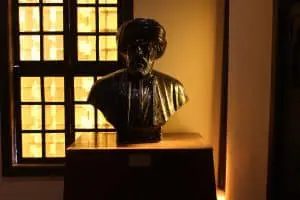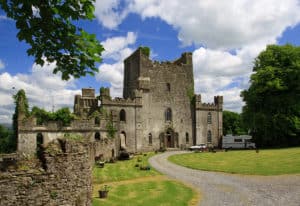Immortal Ink: Unveiling the Best Poets of All Time

Updated On: January 13, 2024 by Yasmin Elwan
Venturing into the vast realm of poetry can feel a bit like scaling Mount Everest, wouldn’t you agree? With so many remarkable voices echoing through the annals of history, it’s enough to have one scratching their head wondering who truly take the cake as the best poets of all time.
Much like yourself, we’ve often found ourselves pondering this very conundrum. Following extensive research and meticulous comparison, we’ve managed to curate a brew that endeavours to answer this tantalising question.
Are you prepared to hop aboard our poetic journey? Don’t let this pass you by; it promises to be an absolute cracker!
Top 10 Best Poets of All Time
Throughout history, certain poets have left an indelible mark on literature. Here’s a concise look at the greatest 10 poets of all time, their impactful contributions, and their lasting influence.
William Shakespeare

William Shakespeare owns a spot in our hearts as one of the best poets of all time. He lived in England a long time ago and became famous for his plays and poems. His words gave us new ways to think about love, life, war, and human nature.
Even if you are on a train journey or sitting by the beach, reading one of his sonnets can take you on an exciting ride into his world full of drama and emotion. You sure don’t want to miss out!
Maya Angelou
Maya Angelou is one of the greatest poets of all time. Her powerful words and inspiring stories have touched the hearts of many. She used her writing to discuss important themes like identity, race, and resilience.
Maya Angelou’s most famous work, “I Know Why the Caged Bird Sings,” is a memoir that explores her own experiences with discrimination and trauma. Her poetry has a unique style that combines beautiful imagery with deep emotion.
Maya Angelou’s impact on literature cannot be overstated, as she continues to inspire readers around the world with her powerful words. Her poems resonate with people from all walks of life.
Robert Frost
Robert Frost, born in San Francisco in 1874, is celebrated as one of America’s most iconic and beloved poets. Renowned for his mastery of rural New England settings, Frost’s poetry often explores complex themes through deceptively simple language and vivid imagery. His work, spanning a career that extended into the mid-20th century, includes timeless classics such as “The Road Not Taken,” “Stopping by Woods on a Snowy Evening,” and “Mending Wall.”
Frost’s verses delve into the human condition, nature, and the choices we make, resonating with readers for their introspective depth and universal themes. Honoured with four Pulitzer Prizes for Poetry, Frost’s legacy endures as a cornerstone of American literature, inspiring generations with his keen observations of life’s intricacies and the enduring beauty found in simplicity.
Emily Dickinson
Considered one of the foremost poets in history, Emily Dickinson, an American literary luminary of the 19th century, crafted a poetic legacy marked by unparalleled brilliance. Renowned for her distinctive style and evocative emotions, Dickinson’s verses traverse a rich tapestry of themes, including nature’s wonders, the complexities of love, the enigma of death, and profound explorations of spirituality.
Her words, often imbued with a mesmerising intensity, offer readers a profound glimpse into the intricacies of the human experience, ensuring that Dickinson remains a timeless figure in the world of poetry.
William Butler Yeats
William Butler Yeats, born in 1865 in Dublin, Ireland, stands as one of the most influential poets of the 20th century. A driving force behind the Irish Literary Revival, Yeats seamlessly merged folklore, mysticism, and political consciousness in his poetry. His early works, deeply rooted in the Celtic Revival, gave way to a more complex and symbolic style as he matured, evident in poems like “The Second Coming” and “The Tower.”
Yeats was awarded the Nobel Prize in Literature in 1923, recognising his profound contributions to literature and his ability to capture the essence of the Irish spirit. His interest in the occult, fascination with myth, and deep contemplation of the cyclical nature of history contribute to the timeless allure of his poetry. Yeats’s eloquence and visionary insights continue to resonate, making him a poetic giant whose words transcend the boundaries of time and place.
John Keats
John Keats, a leading figure of the Romantic poetry movement, was born in London in 1795 and left an indelible mark on English literature despite his brief life, which ended at the age of 25. His poetic brilliance lies in his exploration of beauty, nature, and the transient nature of human existence.
Among his best-known works is the odes collection, including “Ode to a Nightingale,” where he grapples with the contrast between the immortal beauty of the nightingale’s song and the fleeting nature of human life. “Ode to Autumn” vividly captures the beauty of the changing seasons, displaying Keats’s ability to infuse his verses with rich sensory imagery.
“To Autumn,” considered one of the finest English poems, beautifully encapsulates the essence of the season while contemplating the inevitability of mortality. Keats’s unparalleled craftsmanship, poetic sensibility, and profound contemplation of the human experience firmly establish him as a key figure in the Romantic movement, and his works continue to resonate with readers, offering a timeless exploration of beauty and mortality.
Sylvia Plath
Sylvia Plath, a profoundly talented American poet and novelist born in 1932, is celebrated for her powerful, confessional style that delves into themes of identity, mental illness, and the complexities of the female experience. Her magnum opus, “Ariel,” is a posthumously published collection that showcases the raw intensity of her poetry, including iconic pieces like “Daddy” and “Lady Lazarus.”
“Daddy” delves into the fraught relationship with her father, exploring themes of oppression, loss, and personal liberation. “Lady Lazarus” similarly grapples with themes of death and resurrection, embodying Plath’s distinctive voice and unapologetic exploration of her own emotional turmoil. Plath’s only novel, “The Bell Jar,” draws from her own life experiences, providing a semi-autobiographical account of a young woman’s struggle with mental illness.
Plath’s literary contributions, characterised by their emotional depth and linguistic precision, have left an enduring impact, influencing subsequent generations of poets and writers. Despite her tragic end in 1963, Plath’s works continue to resonate, revealing a profound understanding of the human psyche and an unflinching commitment to artistic expression.
Walt Whitman
Whitman, an American poet from the 19th century, is considered one of the greatest poets of all time. His most famous work, “Leaves of Grass,” explores themes of democracy, nature, and human connection.
Whitman’s passionate and honest writing style captivates readers with its vivid imagery and celebration of individuality. He broke traditional poetic forms by using free verse and long lines to express his ideas in a unique way. Whitman’s poems have had a lasting impact on literature and continue to inspire readers today.
Edgar Allan Poe
Edgar Allan Poe is one of the greatest poets of all time. His haunting and darkly beautiful poems have captured the imaginations of readers for centuries. Known for his macabre themes and melancholic tone, Poe’s works like “The Raven” and “Annabel Lee” continue to be widely read and admired today.
His unique ability to create an eerie atmosphere through his words makes him a favourite among fans of mystery, horror, and gothic literature. Poe’s influential writings have left a lasting impact on the world of poetry, making him an essential figure in literary history.
Homer

Homer, the legendary ancient Greek poet, is a foundational figure in Western literature, traditionally credited with composing two of the greatest epic poems of all time, “The Iliad” and “The Odyssey.” These epic works, attributed to him, are monumental in their influence on literature and storytelling. “The Iliad” recounts the Trojan War and explores themes of heroism, fate, and the human condition.
At its centre is the wrath of Achilles, a character whose internal conflicts and external exploits resonate with readers across cultures and eras. “The Odyssey” follows the arduous journey of Odysseus as he strives to return home after the Trojan War, navigating mythical creatures and divine intervention.
Homer’s epics are distinguished by their vivid characters, rich mythological tapestry, and profound exploration of fundamental human experiences. The enduring appeal of Homer’s works lies in their timeless themes, narrative mastery, and their lasting impact on the literary tradition, shaping storytelling for centuries and providing a cultural foundation for Western civilisation.
Ranking Criteria and Controversies
Now, let’s dive into the ranking criteria and controversies surrounding the selection of the greatest poets of all time. It’s a highly subjective topic with personal preferences and biases playing a role, but we’ll also consider their influence on literature, enduring popularity, and contributions to poetry’s development.
Subjectivity in Ranking
Ranking the greatest poets of all time is a subjective task. Everyone has their own personal preferences and biases when it comes to art and literature. What one person considers the best, another might disagree with.
It’s important to remember that these rankings are based on opinions and user ratings rather than objective criteria. Different people value different aspects of poetry, such as its influence on literature, enduring popularity, or contributions to its development.
Therefore, it’s natural for controversies to arise when attempting to create a definitive ranking of the best poets of all time.
Influence and Impact on Literature
Poets have had a significant influence and impact on literature throughout history. Their words, expressed through poetry, have the power to evoke emotions, tell stories, and capture moments in time.
Through their unique use of language and poetic techniques such as rhyme, rhythm, and metaphors, poets create works that resonate with readers for generations. Many of the best poets of all time have made lasting contributions to the development of poetry as an art form.
Their works continue to be studied and celebrated today for their artistic beauty and thought-provoking themes. Whether it is William Shakespeare’s sonnets or Maya Angelou’s powerful verses about resilience and hope, the influence of these poets on literature is undeniable.
Enduring Popularity and Recognition
The enduring popularity and recognition of those poets can be attributed to the timeless resonance of their words, which transcends the boundaries of culture, language, and era. Their ability to articulate complex emotions, explore profound philosophical concepts, and depict the beauty and challenges of life ensures that their works continue to captivate readers across generations.
Additionally, the skilful craftsmanship, unique styles, and innovative approaches of these poets have set enduring standards for literary excellence, influencing subsequent generations of writers and shaping the very fabric of the poetic tradition. The enduring popularity of these poets is a testament to the power of words to transcend time, allowing their verses to remain relevant and cherished by audiences worldwide.
Contributions to the Development of Poetry
Poets have made significant contributions to the development of poetry throughout history. They have brought new ideas, styles, and techniques to the art form, pushing its boundaries and exploring new possibilities.
From William Shakespeare’s mastery of sonnets to Emily Dickinson’s innovative use of language and imagery, poets have shaped and influenced the way we understand and appreciate poetry.
Their works continue to inspire future generations of poets and readers alike, leaving a lasting impact on the literary world. Poetry would not be what it is today without the creative genius of these talented wordsmiths.
Personal Preferences and Biases
Everyone has their own personal preferences and biases when it comes to poetry. Some people may favour romantic poets like John Keats or William Wordsworth, while others may prefer the modern style of poets like Maya Angelou or Langston Hughes.
It’s important to remember that these rankings are subjective and based on individual opinions. What one person considers to be the greatest poet of all time, another person may not agree with.
So, take these rankings with a grain of salt and explore different poets and styles to find what resonates with you personally. After all, poetry is meant to evoke emotions and connect with readers in unique ways.
How do these poets contribute to the literary landscape of the future?
By celebrating their contributions, we acknowledge the profound impact these poets have on shaping the literary landscape, ensuring their legacy continues to influence future generations.
Who is the greatest poet in history?
Deciding the “greatest” poet in history is like crowning the king of mountains—each one conquers in its own way. It depends on personal taste, cultural context, and the impact their words have across time and languages. Ultimately, it’s a beautiful journey to explore different voices and find your own personal Mount Olympus of poetry.
In conclusion, the timeless allure of the best poets of all time lies in their ability to capture the essence of the human experience through words that transcend generations. As we delve into their verses, we find solace, inspiration, and a profound understanding of the universal themes they masterfully explore. Let their words continue to echo through time, reminding us of the enduring power of poetry to captivate and enrich our lives.





